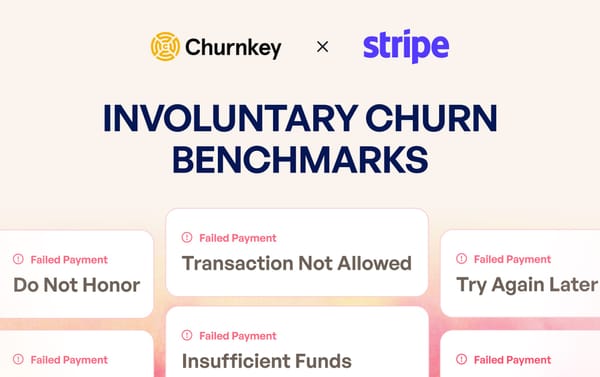How to Do Trial Extensions in Stripe (And When It’s Not Enough)
Trial extensions turn “almost‑there” users into paying subscribers without discounts. Below is a dense, no‑fluff guide: first the native‑Stripe method, and then why Churnkey is the faster, higher‑leverage option.

Why Trial Extensions Work
Not every user gets to your product’s value on day one.
- Some get stuck during setup and trial extensions restore lost time caused by setup friction.
- Others explore but don’t quite commit. Trial extensions nudge high‑intent users who haven’t hit the aha moment.
- You recover would‑be cancellations during trial. A well-timed trial extension gives users space to succeed—without slashing your pricing or handing out discounts.
Real-World Use Cases for Trial Extensions
- Inactivity Triggered Extension.
User signs up but doesn’t log in for 5 days → auto-extension offered. - Paywall Before Setup Complete.
Trial ends before user hits the "aha moment" → extension bridges the gap. - Cancellation Recovery.
User clicks "Cancel trial" → show exit flow offering 7 more days.
How Trial Extensions Work in Stripe
The Manual Method
You can extend a trial in Stripe using the CLI or API:
stripe subscriptions update $SUBSCRIPTION_ID \
--trial_end $(($(date +%s)+604800)) \
--proration_behavior none
This adds 7 more days. Make sure trial_end is a Unix timestamp in seconds, and no more than 730 days in the future.
Pro tip: In JavaScript, useMath.floor(Date.now() / 1000). In Python, useint(time.time()).
Best Practices
- Always set
proration_behavior=noneto avoid unexpected invoices. - Extend only for users who have shown real interest but need more time.
- Set internal limits on extensions per user. You set cooldown periods to reduce abuse via Churnkey.
- Communicate clearly: tell users why they got more time.
- Use
metadatafields to track why an extension was granted.
Common Pitfalls
When extending trials via Stripe without Churnkey, there are some challenges you’ll encounter:
- High engineering overhead: Support/dev time gets expensive fast.
- No user segmentation: You can't personalize who gets an extension. You can't react to inactivity or cancellation attempts.
- No built-in triggers: All users get a one-size-fits-all experience.
- No analytics: Stripe doesn't easily track the boosted revenue from trial extensions. There's no way to A/B test different trial extension lengths, copy, or trigger moments.
Pros and Cons of Using Stripe
Pros:
- Native, built with Stripe-only.
- Free, since there are no extra SaaS fees.
- Directly tied to subscription.
Cons:
- Not free, if you consider hidden cost in engineering resources and internal back-and-forth to ship this project.
- No behavioral targeting
- No real optimization
- No clear analytics to answer, "Does a 7 day trial work better or a 14 day trial for users on a monthly business plan, and by how much in dollar amounts?"
Stripe Leaves the Strategy to You
Stripe gives you tools, not outcomes. Engineers will invest time and energy into setting it up, but is your team equipped to drive business goals?
Churnkey is a Smarter Way to Implement Trial Extensions in Stripe
Churnkey builds trial extensions into your cancel flow and offboarding process. It gives you a smart, automated way to save users who would otherwise churn.

How Churnkey Adds To Your Stripe Setup
We integrate natively with Stripe, so all your billing data is handled via Stripe.
| Feature | Churnkey | Stripe |
|---|---|---|
| In-flow offers | ✅ No-code and customizable | ❌ |
| Behavior triggers | ✅ Usage and intent aware | ❌ |
| A/B testing | ✅ Native and effortless | ❌ |
| Analytics | ✅ Real-time results, including revenue lift | ❌ |
| Fully automated | ✅ Hands-off iteration after initial setup | ❌ |
To get started, sign up for Churnkey or book a demo.
Boost Trial Recovery with Churnkey
- Churnkey delivers Trial Extension offers contextually—only when a user starts the process of cancelling their trial and fit your conditions.
- You can tailor offers based on plan, usage, payment intent. Different users get different offers and messaging.
- You will see exactly how many accepted, converted, or re-churned.

- Set it up once inside Churnkey's dashboard and then anyone in your team can iterate.
- If someone declines the extension, you can collect feedback too. Tie the feedback to lost MRR so you can prioritize which features to build.
How to Setup Trial Extensions in Churnkey
- Connect Stripe and make sure you’re using the trial periods in your subscriptions.
- Create Rules: e.g., offer a 7-day extension if a user cancels but hasn’t activated.
- Customize the offer and copy.
- Launch: We handle the API, timing, and tracking.
- View Analytics: Metrics like offer acceptance rate, boosted revenue, and more are visible to you.
- Set Up A/B tests: Our support team is here to workshop best offer types with you.
To get started, sign up for Churnkey or book a demo.
Pros and Cons of Using Churnkey for Trial Extensions
Pros:
- Fully automated and scalable.
- Increases trial-to-paid conversion significantly.
- Personalized experiences feel more genuine to users.
- Easy A/B testing and optimization.
Cons:
- Additional SaaS cost, and integrating a 3rd party tool. We’re GDPR and SOC-2 compliant and some of the largest companies in the world trust us to keep their data safe.
- Requires basic integration with your billing provider. Churnkey is a verified Stripe partner.
To get started, sign up for Churnkey or book a demo.
Timing Strategies for Trial Extensions
There’s no one right trial extension length. The right timing depends on the nature of your product and how your customers evaluate it. For example:
- B2C SaaS Tool: Consumer-facing apps like fitness trackers or photo editors might perform well with a 14-day trial — long enough for users to explore key features but short enough to maintain urgency.
- CRM Software: Business tools like CRM platforms often need a longer trial period (around 30 days) to give companies time to integrate the tool into daily workflows and properly assess its value.
You can pass a custom variable based on your core action metric into Churnkey and create two segments:
- At-risk users → offer a longer trial
- Activated users → offer a shorter trial
The longer the trial, the more potential revenue you might delay. Too short, and you might lose customers who needed more time.
You can set up trial extension offers through email, SMS, or the cancellation flow.
Recommended Reading:

Final Takeaway
If you only need a few manual trial extensions, Stripe is enough.
If you care about saving more customers at scale, personalizing experiences, and boosting revenue intelligently, Churnkey is the clear choice.
| Stripe | Churnkey | |
|---|---|---|
| One-size-fits-all extension | ✅ | – |
| Scaling trial recovery | – | ✅ |
| Segmentation and conversion analytics | – | ✅ |
| Low developer bandwidth | – | ✅ |
To get started, sign up for Churnkey or book a demo.




